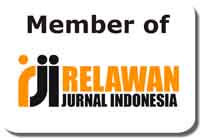EFL Students’ Perceptions of TPACK Implementation in a Hybrid Classroom
Abstract
Keywords
Full Text:
PDFReferences
Abdelrahman, N., & Irby, B. J. (2016). Hybrid Learning. International Journal of Information Communication Technologies and Human Development, 8(1), 1–25. https://doi.org/10.4018/ijicthd.2016010101
Ali, F., & Sofa, E. M. (2018). Students'perceptions of The Implementation of Blended Learning in a Large English Class. Edulitics (Education, Literature, and Linguistics) Journal, 3(1), 15-28.
Aristeidou, M., & Cross, S. (2021). Disrupted distance learning: the impact of Covid19 on study habits of distance learning university students. Open Learning, 36(3), 263–282. https://doi.org/10.1080/02680513.2021.1973400
Dhawan, S. (2020). Online Learning: A Panacea in the Time of COVID19 Crisis. Journal of Educational Technology Systems, 49(1), 5–22. https://doi.org/10.1177/0047239520934018
Endah Wulantina, S. M. (2019). Persepsi Peserta Didik terhadap Metode Blended Learning dengan Google Classroom. Jurnal Inovasi Matematika, 1(2), 110–121. https://doi.org/10.35438/inomatika.v1i2.156
Eyal, L., & Gil, E. (2022). Hybrid Learning Spaces—A ThreeFold Evolving Perspective. In Hybrid Learning Spaces (pp. 11–23). Springer.
Huang, F., & Teo, T. (2021). Examining the role of technologyrelated policy and constructivist teaching belief on English teachers’ technology acceptance: A study in Chinese universities. British Journal of Educational Technology, 52(1), 441–460. https://doi.org/10.1111/bjet.13027
Ikhwan, E. J. Q., & Widodo, P. (2019). Attitude Conception: The Role of Blended Learning in Environmental Education. Online Submission, 2(6), 53–62.
Ismaili, J. (2020). Evaluation of information and communication technology in education programs for middle and high schools: GENIE program as a case study. Education and Information Technologies, 25(6), 5067–5086. https://doi.org/10.1007/s10639020102241
Jamila, Ahdar, & Natsir, E. (2021). Problematika Guru dan Siswa dalam Proses Pembelajaran Daring pada Masa Pandemi Covid19 di UPTD SMP Negeri 1 Parepare. L Ma’ Arief: Jurnal Pendidikan Sosial Dan Budaya, 3(2), 101–110. https://ejurnal.iainpare.ac.id/index.php/ALMAARIEF/article/view/2346
Kadafi, M. I., Tahir, M., & Jiwandono, I. S. (2022). Dampak Pandemi Covid19 Terhadap Proses Pembelajaran di Kelas IV SDN 34 Mataram. Jurnal Ilmiah Profesi Pendidikan, 7(3), 1247–1256. https://doi.org/10.29303/jipp.v7i3.615
Liu, S., Liu, H., Yu, Y., Li, Y., & Wen, T. (2014). TPACK : A New Dimension to EFL Teachers ’ PCK. Journal of Education and Human Development, 3(2), 681–693.
Matthew J . Koehler , Punya Mishra, and W. C. (2013). What Is Technological Pedagogical Content Knowledge ( TPACK )? Michigan State University. Journal of Education, 193(3), 13–19.
Michotte, A. (2019). No Title. In The Perception of Causality (1st ed). London: Routledge.
Padmo, D., Ardiasih, L., & Idrus, O. (2020). Online Learning During the Covid19 Pandemic and Its Effect on Future Education in Indonesia (pp. 71–86). https://doi.org/10.51432/9781838152406_5
Paduraru, M. E. (2019). Students ’ Perceptions towards Blended Learning in Teaching and Learning The 14 th International Scientific Conference eLearning and Software for Education Bucharest , April 1920 , 2018. June. https://doi.org/10.12753/2066026X18061
Pratolo, B. W., & Solikhati, H. A. (2020). Investigating teachers’ attitude toward digital literacy in EFL classroom. Journal of Education and Learning (EduLearn), 15(1), 97–103. https://doi.org/10.11591/edulearn.v15i1.15747
Schmid, M., Brianza, E., & Petko, D. (2020). Developing a short assessment instrument for Technological Pedagogical Content Knowledge (TPACK. xs) and comparing the factor structure of an integrative and a transformative model. Computers & Education, 157, 103967.
SofiKarim, M., Bali, A. O., & Rached, K. (2022). Online education via media platforms and applications as an innovative teaching method. Education and Information Technologies, 0123456789. https://doi.org/10.1007/s10639022111880
Staker, H., & Horn, M. B. (2012). Classifying K12 Blended Learning. Innosight Institute, May, 22.
Swedberg, R. (2020). Exploratory Research. In C. Elman, J. Gerring, & J. Mahoney (Eds.), The Production of Knowledge: Enhancing Progress in Social Science (pp. 17–41). Cambridge University Press. https://doi.org/10.1017/9781108762519.002
Thirunavukkarasu, M. (2021). Techno Pedagogical Skills among B.Ed., Student Teachers. International Journal of All Research Education and Scientific Methods (IJARESM), 9(4), 2455–6211.
Tuzahra, F., Sofendi, S., & Vianty, M. (2021). Technology Integration of the InService EFL Teachers: A Study at a Teacher Profession Education Program. Indonesian Journal of EFL and Linguistics, 6(1), 317. https://doi.org/10.21462/ijefl.v6i1.396
Zulhernanda, W. (2018). Teachers’ Perceptions on Application of 2013 Curriculum for Elementary School in Medan. Advances in Language and Literary Studies, 9(1), 62. https://doi.org/10.7575/aiac.alls.v.9n.1p.62
DOI: http://dx.doi.org/10.31332/lkw.v0i0.3833
Copyright (c) 2022 Radiah Zakiyati Alim, Nur Alim

This work is licensed under a Creative Commons Attribution-ShareAlike 4.0 International License.
Publisher:
UPT Pengembangan Bahasa, IAIN Kendari
Jln. Sultan Qaimuddin No. 17 Baruga, Kota Kendari, Sulawesi Tenggara
Website: upb.iainkendari.ac.id
Email: [email protected]


















